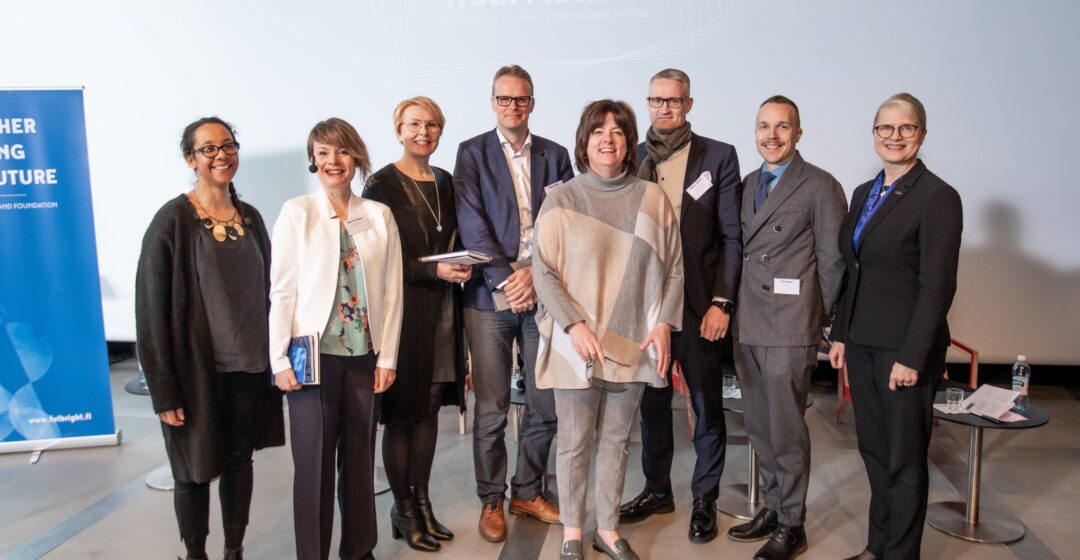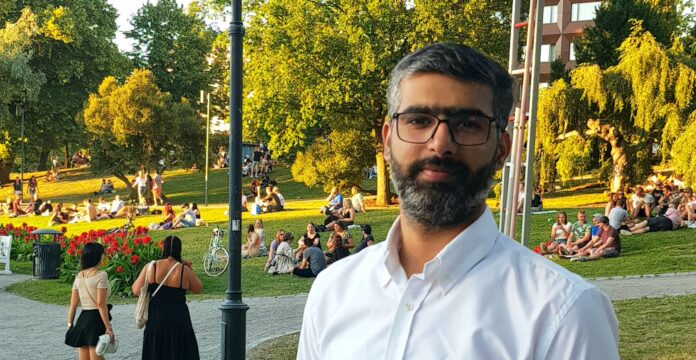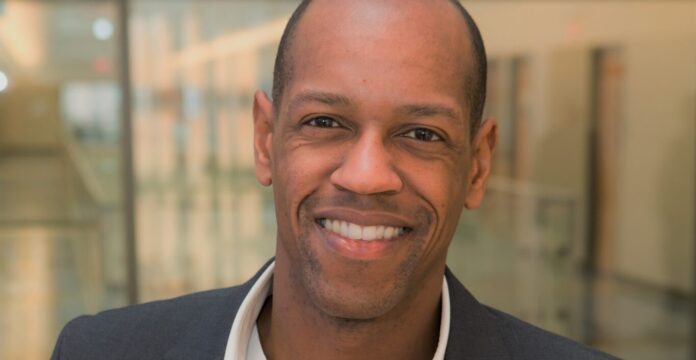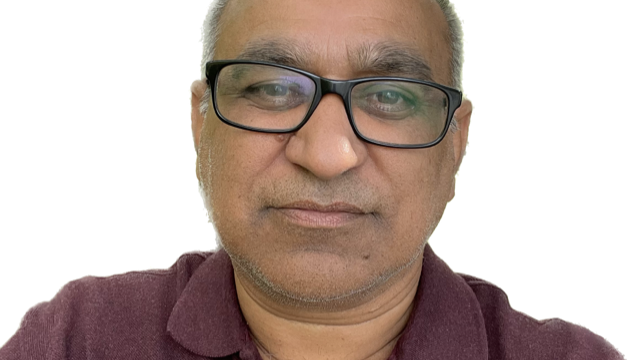Image: Speakers at the Fulbright Finland seminar “Truth Matters” in 2019 (from left to right) included Farida Vis, Mari K. Niemi, Päivi Anttikoski, Mikko Salo, Barbara McGormack, Jarno Limnéll, Olli Seuri, and Terhi Mölsä.* (Photograph by: Studio Terho / Fulbright Finland Foundation)
Our digital era is characterized by post-truth politics – the tendency to accept and promote arguments based on emotions and beliefs, rather than facts and scientific evidence. The Covid-19 pandemic has further stressed the malignancy of manipulated information in public communication, as academic experts and political leaders engage in heated debates across diverse news and social media platforms, determining fates of societies, economies, and citizens in the process.
The Covid-19 pandemic has also accentuated the existence of borders separating regions and nations. Foreign lands now manifest as potential threat zones from where the virus can continue spreading, provoking increasing hate speech and xenophobic attitudes toward people with different cultural backgrounds. Yet, number of distinguished scholars such as Professor Yuval Noah Harari have emphasized that the only way humankind can overcome a crisis such as the current pandemic is through international collaboration.
According to Senator J. William Fulbright, founder of the flagship international educational exchange program between the U.S. and other nations, “the simple purpose of the exchange program (…) is to erode the culturally rooted mistrust that sets nations against one another. The exchange program is not a panacea but an avenue of hope…” This blog post argues that the world is much more likely to discover an avenue of hope, leading to sustainable solutions to complex problems, by recognizing the fundamental value of educational exchanges and ensuring their continuation now and in the future.
The Fulbright Finland Foundation has over 70 years of experience facilitating and widening the exchange of knowledge between Finnish and American scholars and professionals. This blog post is especially inspired by the public seminars “Making Democracies Resilient to Modern Threats” and “Truth Matters: Strategies for Combating Manipulated Realities,” organized by the Foundation in March 2018 and 2019. Just like the enrichment programs destined for Fulbright grantees during exchange programs, each of these seminars brought together academic experts, government officials, journalists and media professionals from different countries, and encouraged them to bring forth their perspectives while providing an open environment for dialogue and debate.
The Covid-19 pandemic has shown how many current leaders worldwide tend to promote partial and distorted views that flatter their own image and actions, circulating these through their preferred media channels while ignoring, downplaying, and even censoring views that may challenge their actions and positions. Helping to overcome such silos of communication, Fulbright programs are extraordinary in ways they expose participants with different backgrounds to one another’s voices and views, enhancing participants’ empathy and other skills considered as vital for democratic leaders today.
I myself have personal experience of the program’s benefits. Fulbright Finland Foundation’s “Truth Matters” seminar introduced me to media scholars from Lithuania. Our dialogues, embraced with enthusiasm by the Foundation’s CEO Terhi Mölsä and the U.S. Embassy in Vilnius, continued in a Finnish-Lithuanian Fulbright alumni meeting in Vilnius in December 2019. This trip, again, introduced me to Auste Valinciute, president of the US-Lithuanian Alumni Association and specialist in science communication.
Auste and I soon discovered we shared a passion for frame analysis, thanks to our Fulbright experiences in the U.S., which had enabled us to work with Professor Rodney Benson and Dietram A. Scheufele, leading scholars in the field. Framing is about selective perception. By framing, politicians and other actors use journalists to communicate their preferred views on issues to a wider public.
The Covid-19 pandemic has prompted Auste and I to ask increasingly urgent and important questions such as how partial views through narrow frames be expanded; how distorted frames can be replaced with more reliable ones and the motives of framers in public communication made more transparent.
Our plan to start answering them is by organizing a virtual international meeting, inspired by Fulbright Finland’s “Truth Matters” seminar and with the principal aim of understanding how we can jointly make a change. It is important that all those of us who have had the opportunity to engage in international exchanges help support the continuation of open communication between nations through this difficult time.
Kirsi Cheas is a postdoctoral researcher whose new project “Investigating Abuses Against Asylum-Seekers: Contribution to the Cross-Regional Collaborative Model of Investigative Journalism,” sponsored by the Helsingin Sanomat Foundation, will take place at New York University between 2020-2022. She is also a board member of the international Association for Interdisciplinary Studies, and past president and current International liaison of the ASLA-Fulbright Alumni Association.
*Farida Vis is a Professor of Digital Media at Manchester School of Art; Dr. Mari K. Niemi is the Director of University of Vaasa’s InnoLab; Päivi Anttikoski is the Director General of Communications at the Finnish Prime Minister’s Office; Mikko Salo is the co-founder of Faktabaari; Barbara McGormack is the Vice president of Education of the Freedom Forum Institute; Jarno Limnéll is a Professor of Cybersecurity at Aalto University; Olli Seuri is a journalist at the Finnish Broadcasting Company, and Terhi Mölsä is the CEO of the Fulbright Finland Foundation.




